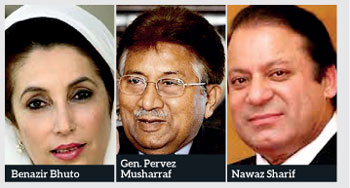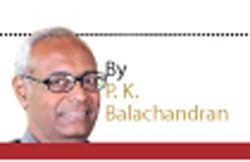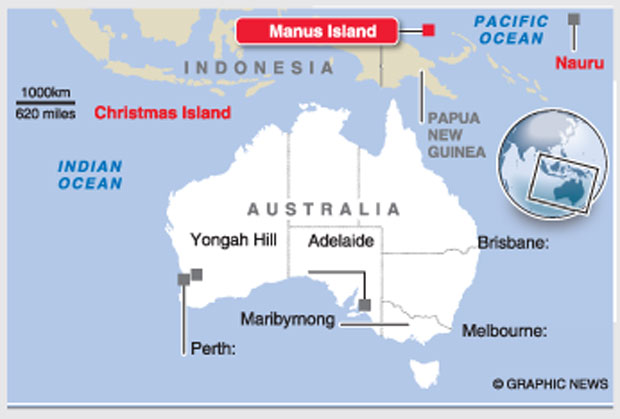Musharaff’s re-entry to politics may usher in greater military involvement

- All Asian countries have seen progress because of dictators - Gen. Musharraf
- Pakistan armed forces had “learned nothing from the fall of Dhaka - Nawaz Sheriff
2017-11-21
 With the exit of Nawaz Sharif from the Prime Minister-ship of Pakistan in July this year, and the recent formation of a 23-party alliance by former military dictator Gen. Pervez Musharraf, the military is likely to acquire a greater role in the troubled country’s politics.
With the exit of Nawaz Sharif from the Prime Minister-ship of Pakistan in July this year, and the recent formation of a 23-party alliance by former military dictator Gen. Pervez Musharraf, the military is likely to acquire a greater role in the troubled country’s politics. In an interview to BBC’s Urdu service in August this year, Gen. Musharraf said that Pakistan had always made progress under military dictators but civilian governments had invariably ruined it.
“All Asian countries have seen progress because of dictators,” he claimed, arguing that it makes no difference to the population of Pakistan whether the country is being governed by an elected government or by an autocrat, as long as there is progress and prosperity.
“What is the point of holding elections and giving liberty [to the population], if the country does not see progress?” he asked.
“People come running to the army to be saved; people come to me asking to be saved,” he said.”We cannot ruin the country in order to save the Constitution. We can disregard the Constitution to save the people,” he asserted.
Musharraf criticized former Prime Minister Nawaz Sharif’s India policy, saying it was a “total sell-out as India is involved in the insurgency in Baluchistan.”
In a frightening warning to dissidents, he said: “ Whoever works actively against the welfare of Pakistan is against the country and should be killed.”
Claiming support from the army for his political future, Musharraf said: “I have served as the head of the army and the army will always protect my welfare.”
Brewing Civil-Military Conflict
Gen. Musharraf’s bid to come back to politics from exile in Dubai and his remarks hailing military rule, coincide with a brewing conflict between Pakistan’s civilian government and the military. The conflict should be taken seriously because the military has never been far from power since Gen. Ayub Khan staged a military coup in the 1950s. Pakistan has been under military dictators for 33 out of its 70 years.
On October 2 this year, during a court hearing in which Nawaz Sharif was appearing to face charges of corruption, Ahsan Iqbal, the Interior Minister, was prevented from entering the court by troops of the “Pakistan Rangers”, a paramilitary force under his own ministry.
A shocked Iqbal asked if Pakistan was a “banana republic or a constitutional republic” and swore that he will not be a “puppet interior minister.”
Back in December 2011, the then Prime Minister Yousaf Raza Gilani, had said that there could not be a “state within a state” obliquely referring to the army and the Inter-Services Intelligence (ISI) functioning independently of the elected government. And hardly six months after his “state within a state” remark, in June 2012, Gilani was disqualified by the Supreme Court. Some Pakistani commentators termed this as “judicial dictatorship”.
 Since his election in May 2013, Nawaz Sharif had kept trespassing into well-defined “no go” zones for civilian leadership, and had tried to see that the civilian writ ran in areas that the military sees as its private domain. The military viewed with disfavour Sharif’s policy of seeking greater trade and political détente with India.
Since his election in May 2013, Nawaz Sharif had kept trespassing into well-defined “no go” zones for civilian leadership, and had tried to see that the civilian writ ran in areas that the military sees as its private domain. The military viewed with disfavour Sharif’s policy of seeking greater trade and political détente with India. Sharif’s move to get Musharraf punished for his “unconstitutional” steps; and his refusal to extend the service period of army chief Gen. Raheel Sharif, did not go down well with the military.
In a tit-for-tat response to Sharif’s disqualification form the Prime Minister-ship and the leadership of his party, the Pakistan Muslim League (PML-N), the National Assembly passed the Election Act of 2017 on October 2, to enable Sharif to lead his party.
Accusing the Pakistan army and military dictators of incompetence Sharif had said that the Pakistan armed forces had “learned nothing from the fall of Dhaka,” referring to Pakistan’s dismemberment in 1971 as a result of the unthinking actions of the then military dictator Gen.Yahya Khan.
Differences Over Islamic Militants
Pakistan’s civilian and military leaderships disagree on the approach towards the various Islamic militant groups in the country. Even as the military is fighting militants all over the country, especially on the border with Afghanistan, it is accused of mollycoddling some of them to use them against India and Afghanistan.
Sharif did not approve of the army’s distinction between “good and bad terrorists.”While the army is fostering the Haqqani group, Hafiz Sayeed and Lashkar-e-Tayeba (LeT), Foreign Minister Khwaja Asif has openly said that these groups are “liabilities” which must be jettisoned.
While the army had been wanting to “mainstream” Islamic militant groups by allowing them to contest elections, Sharif had said “no”. Nevertheless, the army backed a candidate of the Jamat-ud-Dawa (JuD), the second incarnation of the Lashkar-e-Tayeba (LeT), in a recent by-election in which the winner was Kulsoom Nawaz, wife of Nawaz Sharif.
Earlier in 2015, the Pakistan People’s Party Co-Chairman, Asif Ali Zardari had lashed out at the military establishment for their “interference” in political matters.
“If you do not stop, I will come out with a list of accused Generals since Pakistan’s creation,” he threatened.
Nawaz Sharif’s supporters suspect that the judiciary is against civilian governments, a suspicion shared by Asma Jahangir, the doyenne of human rights activists in Pakistan. Addressing the media in August, Jahanghir said that while the judiciary had given judgments against civilians it had never given judgments against the military.
We cannot ruin the country in order to save the Constitution. We can disregard the Constitution to save the people
She pointed out that the Supreme Court had allowed military courts saying that civilian courts were not functioning properly. The National Assembly is not empowered to debate the defence budget, she added.
Significantly, Gen. Musharraf says that he is willing to return to Pakistan and face trial on the charge that he was behind the assassination of former Prime Minister Benazir Bhutto. The July ruling of the Supreme Court against Sharif on the unaccounted wealth case (Panama Papers case), gives Musharraf the confidence that he will be let off the hook.
While Imran Khan’s Pakistan Tehreeq-e-Insaf (PTI) party is quite unabashedly pro-army, the Pakistan Peoples’ Party (PPP) gets soft towards the army when it is in the opposition. Senator Saleem Mandviwala of the PPP told journalist Daud Khattak in October: “The military’s interference has always been there, but that does not mean that it is responsible for every wrong.”
Though not much credence is given at this juncture to Gen. Musharraf’s claims of becoming a major factor in Pakistani politics, he could be used by the armed forces to push their case against unbridled civilian rule which, thanks to the doings of Sharif and Zardari, are known for corruption.

But Asma Jahanghir says that the dim assessment of civilian rule is unfair and unwarranted as civilian rule or democracy has not been given a fair chance to prove its worth. “The military has taken over too quickly citing peoples’ disenchantment,” she told a seminar in Colombo sometime ago.
She also pointed out that people who had welcomed military rule had had to fight for its removal and replacement by civilian rule.


